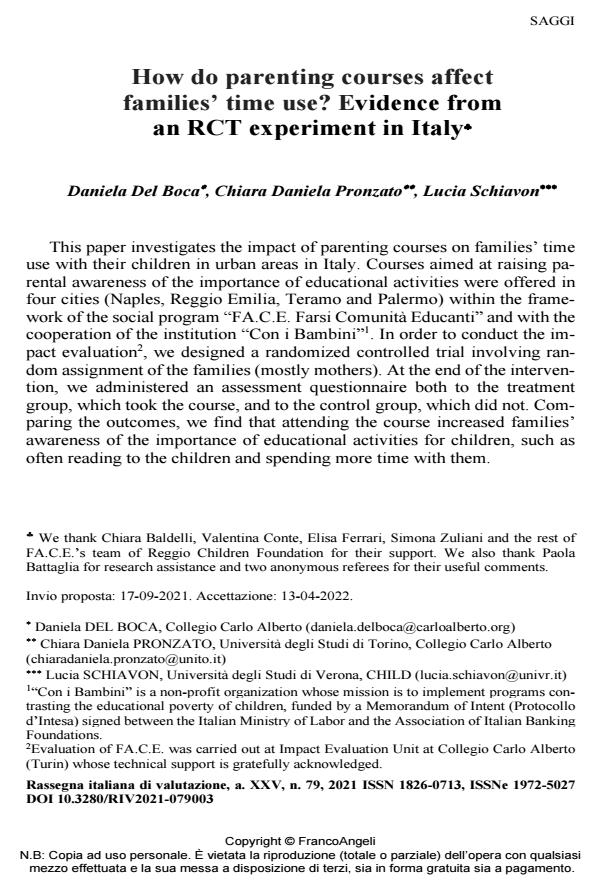How do parenting courses affect families’ time use? Evidence from an RCT experiment in Italy
Journal title RIV Rassegna Italiana di Valutazione
Author/s Daniela Del Boca, Chiara Daniela Pronzato, Lucia Schiavon
Publishing Year 2022 Issue 2021/79 Language English
Pages 21 P. 39-59 File size 289 KB
DOI 10.3280/RIV2021-079003
DOI is like a bar code for intellectual property: to have more infomation
click here
Below, you can see the article first page
If you want to buy this article in PDF format, you can do it, following the instructions to buy download credits

FrancoAngeli is member of Publishers International Linking Association, Inc (PILA), a not-for-profit association which run the CrossRef service enabling links to and from online scholarly content.
- Battilocchi, G. L. (2020). Educational poverty in Italy: concepts, measures and policies. Central European Journal of Educational Research, 2(1), 1-10. DOI: 10.37441/CEJER/2020/2/1/5753
- Campbell F., Conti G., Heckman J. J., Moon S. H., Pinto, R., Pungello E. and Pan Y. (2014). Early childhood investments substantially boost adult health. Science 343, (6178), 1478- 1485.
- Carneiro P.M. and Heckman J.J. (2003). Human Capital Policy IZA WP. 821.
- Daly M. (ed.) (2007), Parenting in contemporary Europe: a positive approach, Strasbourg: Council of Europe.
- Daly M., Delaney L., Doyle O., Fitzpatrick N., O’ Farrelly C. Can early intervention policies improve wellbeing? Evidence from a randomized controlled trial, WP. 201410, University College Dublin 2014.
- Del Boca D., Monfardini C. and Nicoletti C. (2017). Parental and child time and cognitive development of adolescents, Journal of Labor Economics 35(2): 565‐608, April.
- Del Boca D. (2015). Child care Choices and Child Outcomes, IZA World of Labor , Number 134, March.
- Del Boca D., Flinn C., and Wiswall M. (2014). Household Choices and Child Development, The Review of Economic Studies, Volume 81, Issue 1, January 2014, Pages 137–185.
- Doepke M. and Zilibotti F. (2017). Parenting With Style: Altruism and Paternalism in Intergenerational Preference Transmission, Econometrica, 85: 1331-1371. DOI: 10.3982/ECTA14634
- Doyle O., Harmon C., Heckman J.J., Logue C., Moon S.H. (2017). Early skill formation and the efficiency of parental investment: a randomized controlled trial of home visiting, Labour Economics 45, 40-58.
- Doyle O. (2020). The First 2,000 Days and Child Skills, Journal of Political Economy, University of Chicago Press, vol. 128(6):2067-2122. DOI: 10.1086/705707
- European Union (2013). Involving Parents in the Education of their Children, -- http://europa.eu/epic/practices-that-work/practice-user-registry/practices/involving-parents-children-education_en.htm.
- Fiorini M. and Keane M. (2014). How the Allocation of Children’s Time Affects Cognitive and Noncognitive Development, Journal of Labor Economics, 32:4, 787-836. DOI: 10.1086/677232
- Guryan J., Hurst E. and Kearney M. (2008). Parental education and Child Outcomes, Journal of economic Perspectives vol 22:3.
- Heckman J.J. (2000). Policies to foster human capital, Research in Economics vol 54:1, 3-56.
- Hsin A. (2009). Parent’s Time with Children: Does Time Matter for Children’s Cognitive Achievement?, Social Indicators Research 93, 123–126.
- Moran P., Ghate D. and Van der Merwe A. (2004). What works in parenting support? A review of the international evidence, Policy Research Bureau, Research report No 574, p.129. 35.
- Saraceno C. (2018). The Long Lasting effects of educational poverty among children in Italy, CarloAlberto Notebook n.595.
- Wagner M.M., Clayton S.L. (1999). The Parents as Teachers Program: Results from two demonstrations, The Future of Children, 9 (1), 91-115. DOI: 10.2307/1602723
Daniela Del Boca, Chiara Daniela Pronzato, Lucia Schiavon, How do parenting courses affect families’ time use? Evidence from an RCT experiment in Italy in "RIV Rassegna Italiana di Valutazione" 79/2021, pp 39-59, DOI: 10.3280/RIV2021-079003